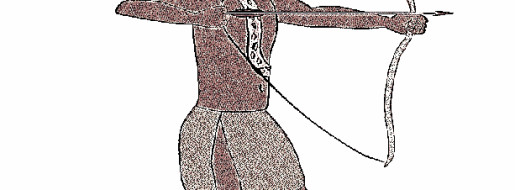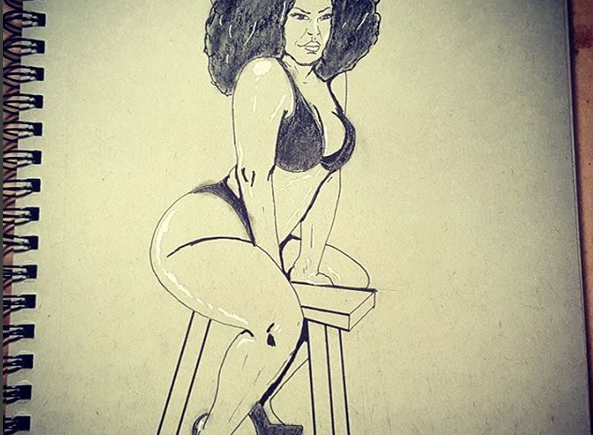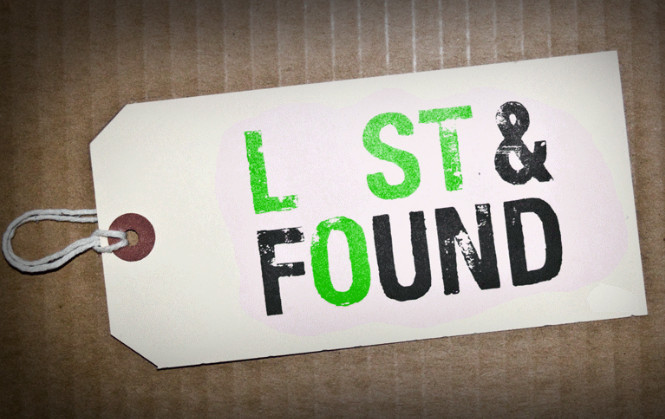Lonely Roads – Previous Episodes: Prologue, Chapter 1
Even though Afam tried not to think about his encounter with the oyibo, he thought of nothing else until he was home. The clay hut he lived in with his mother was surrounded by a short bamboo fence, a symbol used to mark them as outcasts.
Onu never spoke of it but she remembered the day she became an osu (outcast) like it was only yesterday. It was towards the end of the rainy season and the village was plagued with a dangerous illness that always came with the rain. Villagers were dying of a fever that brought tiredness and left a bitter taste in their mouth. In Aboh the alusi (deity) required different levels of sacrifice depending on how angry the people made it. In small cases a cock or a goat would suffice. When the situation was serious, a cow would be sacrificed. But of all the sacrifices, a human sacrifice was the highest. No one ever volunteered for this because everyone in the village knew what it meant. The animals used to appease the alusi were not slaughtered. They were left to wander around the village, but no one dared to touch them, much more eat them. It was no different with people. No one in the village wanted to have anything to do with an osu. The bamboo fence was a symbol to show that Onu and her son had been ostracised from fellowship in the village.
Onu was lost in her thoughts looking back at the horrible morning when she was down at the Okili River to fetch some water. She remembered the men with heaving chests and scary eyes. From the start she knew she did not stand a fighting chance. As they bound her by the ankles and wrists she kicked and screamed in vain. She prayed to the gods, hoping to wake from sleep to realise it was nothing but a bad dream, a nightmare. No such thing happened. She swore to herself never come to the river alone again, but it was too late. She was carried through bushes and canoed across waters before they got to the village shrine.
She could remember the old priest, his grey beard and shaved head. She remembered the chalky symbols drawn on his wrinkled body, the white cloth wrapped around his waist. She was still kicking and screaming until she noticed the animal and human skulls that littered the shrine. Fear like she had never known before stopped her. Her mouth went dry and she felt her stomach twist and knot. Onu had only seen seventeen rains. She thought the gods were unfair to her to take her life away now.
The dibia (priest) of the shrine spoke incantations to the alusi, telling it that he had brought it a woman as was demanded. She was pushed before the shrine and stripped naked in order for the alusi to know that it was indeed a woman. The servants of the alusi drummed and danced around a bonfire as part of the ritual, each beat of their udu sending her deeper into an abyss of hopelessness.
She remained in the shrine for a few days, sleeping under the same tree. It was believed that only under that tree was she free from the evil spirits that wanted to take her from the alusi. Under this tree she thought through her entire life and she realised that it would never be the same again. The loneliness she felt spending days in the company of the naked sun and the sounds of drums gave her some insight to what the future held for her.
When the ritual was complete she was escorted back to the village where she was declared an osu in the market square. Ever since then, her life had never been the same, as she knew it wouldn’t be. Even her own family distanced themselves from her. She became a wanderer in her own village, a stranger in her own land. She ate only what she farmed and cooked, or what was provided for her by the dibia. The dibia saw to it that a hut was built for her, as her parents would not house her anymore. She was property of the gods; it was his duty as messenger to the gods to see to her wellbeing.
But even in the midst of all the suffering, all the pain, all the agony, there was one thing that remained the same, Esimai Akubor. Onu’s lover did not forsake her. It was dangerous for them to be together, but in the foolishness that blinded lovers they took risks they should have avoided. Their meetings were in the most unholy hours of the night when only the owls and bats could tell their story.
During one of their meetings one thing led to another, and Esimai entered her. It was when she was with child that they realised the stupidity and foolishness in what they had done, what they had been doing. Esimai was not a commoner in Aboh. He was a warrior – not just any warrior, but a commander in the village army. Onu could not let the shame of an osu carrying his child befall him. In secret she wrapped all that she needed in a sheet of cloth, and she journeyed to another village.
She left in the dead of night with a heavy heart. She was already worrying about the life her unborn child was going to live. There was a saying, ‘Agwo ayaro imu ife solu ogonogo’: ‘A snake must always give birth to something long.’ This saying means that just as the child of an Obi will be royal, the child of an oru (slave) be an oru, the child of an osu would be an osu too. More than anything, she prayed for a man-child; she didn’t wish the pain she felt to befall another woman.
Onu knew that if not for Esimai who brought her not just food and cowries, but conversation and intimacy, she wouldn’t have survived in Aboh. As she walked away with shoulders heavy with worry, she swore never to put this on him. He had done enough for her as it was. She thought how he would come to her hut in the night to discover that she was gone. She tried to imagine his feelings. When she was with him she could not imagine a man loving her more than he did. As she left Aboh and Esimai, she sobbed in the darkness. Not for the village, but for Esimai. She wondered if she was ever going to see him again. She wondered if her child would ever know the truth. She was not so sure if she could bring herself to tell her child the story. And even if she could, it would be when the child had grown old and wise enough to handle the truth.
After travelling through the night she made it to a neighbouring village called Kuwale. There she made herself an oru in exchange for food and shelter. She did a lot of laborious work, both on the farm and in the household. Her master was a kind man who understood the complexity of her situation, but his wife had a sharp tongue that cut through Onu with a different curse and accusation each day. As an oru, Onu dared not to challenge her master’s wife. Sometimes she was even physically pounded, but she endured. Her stomach grew bigger with each moon that passed, and after nine moons, she was delivered by an oyibo doctor.
The doctor told her his name was William Walker but she knew better than attempting to pronounce it. It was no secret in Kuwale that the oyibo kidnapped people and took them to their land where they would serve as oru to the oyibo. But William was different. He wasn’t here because he wanted the money. It was the sum of his many misfortunes that brought him to Africa. It was an act of desperation. Naturally he had a soft hand, and even a softer heart. He heard the worrying sounds of labour pains and he did what he felt was right. After the delivery, he left the hut carrying with him a secret that would shape his life forever. It was for this reason that Onu could never find it in her to tell her son that oyibo men were evil. The very man who removed him from her womb was an oyibo.
After Abga was born the master’s wife accused Onu of sleeping with her husband. As an oru she could not sleep in the same hut with her master’s family. The master’s wife knew this, and she knew Onu never slept with her husband, but she just wanted to get rid of her. However, in Kuwale, like most eastern villages, a woman’s word carried no weight after a man had spoken. The master spoke and Onu lived in Kuwale for another seven rains. During this time things got worse between her and the master’s wife. It got to a point when Onu’s pride couldn’t bear the insults she was receiving before her growing son, and then she decided to go back to Aboh.
The trip back was very difficult with a seven year-old boy. But it could have been worse. Afam was more or less an adult trapped in the body of a child. Onu thought he had the wisdom and strength of his father. She hopped he wouldn’t fall foolishly in love like Esimai, for in the end there was nothing but pain and sorrow. Afam walked with his mother, refusing to be carried even when she offered. He ate little and drank little. Even as a child when nothing had been said to him, Afam knew his mother was not normal. He knew that there were circumstances in her life that had put her somewhere beneath a commoner. He had so many questions, but he spoke very little. Ever since he was aware of his thoughts, he had been a thinker. He searched his mind for answers to questions that troubled him, and most of the time he found them. It hurt Onu deeply to know that even with all the wisdom and strength her son would grow into a man to posses, like her he would always be beneath the commoners.
When Onu came back to the village she told everyone that Afam was an adopted son from another woman. She claimed that the woman died in childbirth and she could not leave the boy on his own. She couldn’t tell the truth because it would mean that the sacrifice had been defiled. As property of the gods she was forbidden to ever know a man intimately. What they would do to her she wasn’t sure of, but she didn’t want to find out either.
On returning to her home, Onu realised that her hut had remained untouched for all the years she had been away. The dibia believed her story and asked the village to accept the boy. But for the boy to live and eat with Onu, he too would have to be regarded as an osu.
During the time Onu was gone Esimai had risen in rank to become a person of substance in Aboh. This meant there were more eyes on him, thus his romance with her was too risky to continue. They saw each other in passing and exchanged looks with hidden meaning. They were still in love with each other, but they were now wise enough to know better. They allowed their feelings to show only in those passing glances. Afam was told nothing about his father and he suspected nothing. One day he asked his mother for the truth.
‘Mama, kedu onye bu nna’m?’
Onu knew the question was coming but she had never prepared an answer. She was cutting up some vegetables by the cooking pot when this question arose. For a few breaths she didn’t reply. There was an almost overwhelming urge to tell the boy his father was Esimai. Everyone in the village knew what a warrior Esimai was. He was even Afam’s personal hero. Afam often said he would grow up to be as strong as Esimai the great warrior, the wrestling champion.
After some deep thought and consideration, Onu told her son that she did not know who his father was. Before he could come up with following questions she asked him never to speak on the subject again. Onu didn’t spank or cuff her son often, but he had fear and respect for her. Afam dropped the issue and never picked it up again.
* * *
Onu hardly ever discussed her past with Afam. But now he wasn’t a boy anymore. As a full-grown man he had come to know about the customs of the land, the tradition, the culture. He knew what was punishable by death, what was punishable by banishment, and what it took to have a bamboo fence around your hut. He had come to know that his mother was an osu, that the village believed he wasn’t even one of them, they thought of him as an adopted son. He had come to know that the rest of his bloodline would never be Obis or chiefs. His mother’s mistake, whatever it was, had cursed the rest of his lineage to life as outcasts.
Afam wasn’t after chieftaincy or the fame that came with it; neither did he hunger for the accumulation of wealth. All he had in this world was Adaobi and the mother who loved him. And that was all he needed. Well, all he thought he needed at the time. Although Afam was wise and strong, he lacked a lot of experiences. The isolation he lived in made him blind to a lot of things in life. All he knew was what was in his own little world, and there wasn’t a lot there. He knew nothing about friendship so he knew nothing about trust. He knew nothing about trust so he knew nothing about secrets. He knew nothing about secrets so he knew nothing about betrayal. Lies and backstabbing had no place in his life. Adaobi was the only person besides his mother who shared his thoughts. She had never hurt him before, and he believed she never would.
Story by William Ifeanyi Moore






6 comments
I love this story. All I have to say…
Thanks Nathan
wow this could be a script for a movie if you ask me. every inch of it makes your imagination run wild..thanks Elsieisy for stopping by my blog..ps..i now have the follow by email link so you won’t have a problem following me now..*wink wink*www.mchantella.blogspot.com
uwc, thanks Chantel